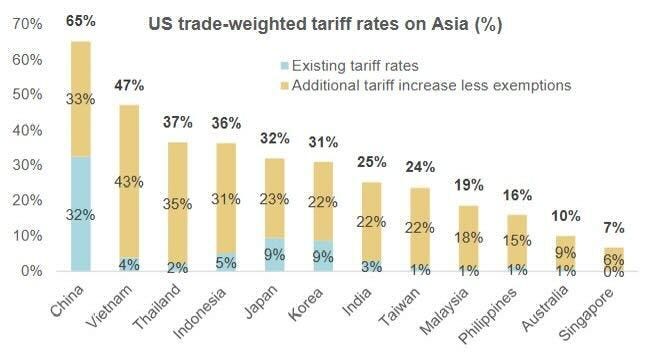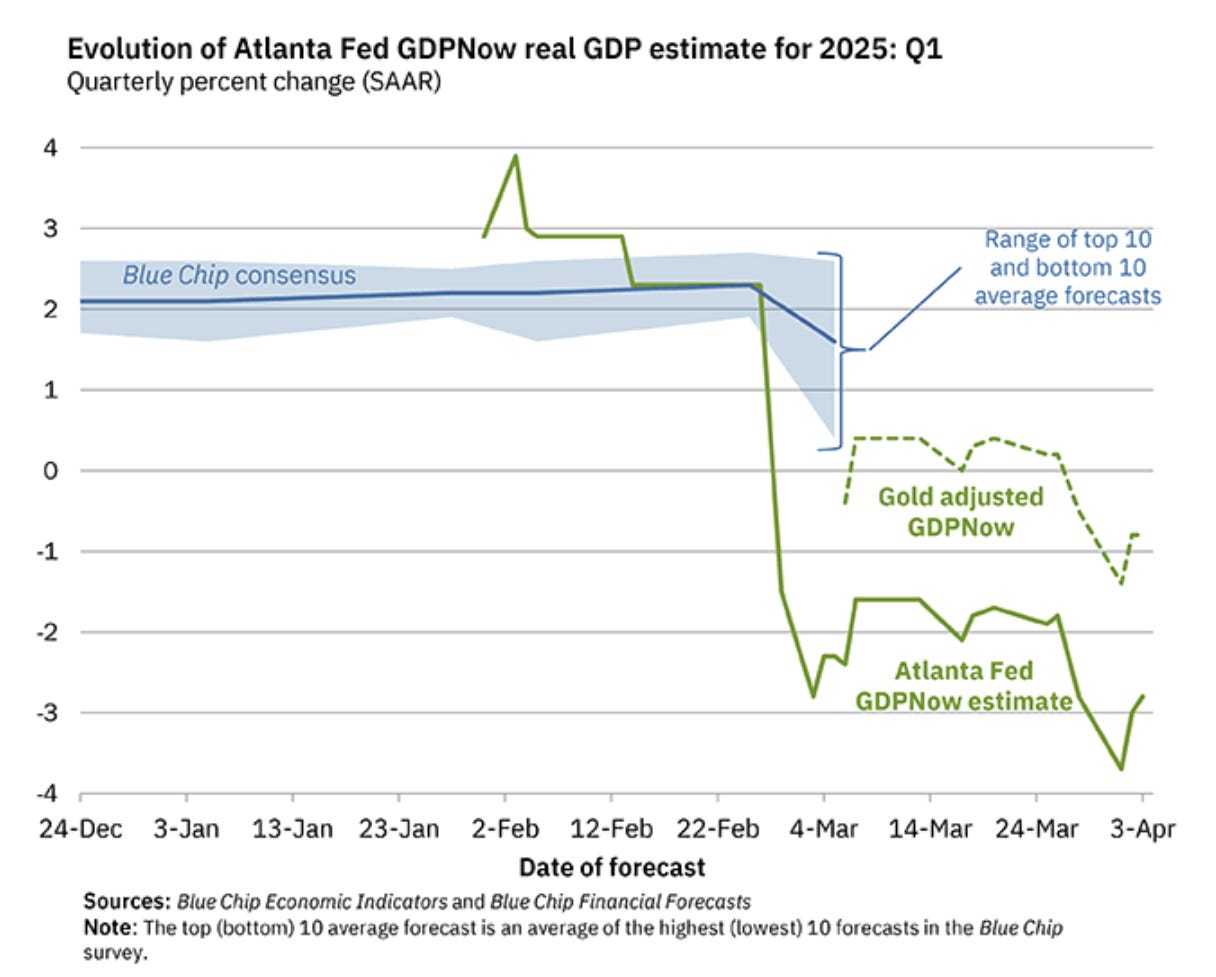Liberation Day and The New World Order
Superpower Suicide Continues. I think I'll call it L Day for Short
I almost wrote an April Fools post about how this would become a macroeconomic newsletter. Two days later, I think I’m about to write the most macro-brained piece yet. And now you ask, why are you focused so heavily on macro? And that’s because macroeconomics will trump every micro move for the foreseeable future.
Semiconductors are not only cyclical but are heavily dependent on economic activity. From my view, economic activity is changing, so it’s now time to focus not on the bottom up but on the top down. There are a few times to care about macro in markets, and it’s almost always at inflections. Today, we are probably at the biggest inflection of this decade, including COVID.
A Tariff Summary
If you haven’t heard, the big news is tariffs. The Trump administration chose a surprising and confusing deficit compared to gross exports. LLMs likely conceived this and changed it at the last second. That will be a fun historical fact when we reflect on this moment.
The broad consensus is the number and rate of Tariffs are so high and confusing that many people do not know what to believe or make of it. I think it’s simple: tariffs will probably be terrible for the global economy. I am going to simplify a lot of things and go with the number “25%”. That’s approximately Taiwan’s rate, which is the country I’m most concerned about. Country by country, it can be a lot higher, and for now, semiconductors are exempt.
They will be dealt with when section 232 of the Trade Expansion Act of 1962 is finalized. These tariffs will be harder to undo and not as easy to lift as the HTS class. The summary here is big tariffs, which are confusing and bad.
But what matters more than big bad tariffs is how this impacts the US economy and, more importantly, how this impacts the global economy.
A Changing World Order
Please sit down for this section. It will be pretty broad-ranging, but I feel strongly about it. For the first time since 1989, and arguably since the 1940s, we are seeing a changing world order.
One of the most formative books I have ever read was Henry Kissinger’s World Order. However you feel about the man, he was a systems-level thinker who was unequaled, especially in the heavily context-dependent hegemony that we live in today. Kissinger’s book describes the world order from the perspective of 2015, and I believe that his prevalent structure was mainly intact.
Now we are at a crossroads. It’s no secret that the United States alienates its partners, including our neighbors and transatlantic relationships forged out of World War 2. The US-centric world order was forged from a strong global manufacturing base backed by defense spending, which merged into a strong trade-based base. The international reserve currency was cemented during the Brettonwood system, making the United States dollar the global clearing currency.
Ironically, instead of backing the global world order by defense via planes and missiles, the United States ended up with a considerable asset imbalance via treasuries, which foreign countries purchased en masse, and massive influence over the assets that they owned. This weird power has tied the global financial order together for decades. Even if you disagreed, you had so much of a stake in the US government via their paper that you had some incentive to go along. So this is how hard power shifted to soft power in the post-1989 era after the Cold War.
This is changing very, very quickly. Imagine Bretton Woods and the reserve currency as this significant financial entity that the US has safekeeping or gatekeeping over and has buy-in from the world. Everyone is an investor, and the more business you do with the gatekeeper, the more significant your stake in the entity is. It happens over time, but you trust your business partner and consider them your best friend.
Imagine now, one day, you wake up, and your best friend and business partner in your shared financial entity (abstract) says that for all the business you’ve done with them in the past, you must now pay a much steeper fee as well as purchase into your financial entity. The more you own, the more you owe. And until now, your best friend and business partner has been more than happy to loan you as much as you wanted in the name of doing business together. There was no warning, just wake up and a shake down.
Now, here’s the thing. Some amount of negotiation will happen. It probably ends lower than the rate today. But the entire time, this same gatekeeper has warned you about the dangers of doing business with the new and allegedly shady kid down the China block. He does seem scary, but up until this point, they have never harmed you once. Your best friend just did. Your best friend just harmed you in the way they warned you the new shady kid would.
The gatekeeper (USA) is threatening your access to telecommunication networks (Starlink), just like you said the shady guy would do with Huawei. They also unilaterally yanked a long-time JV, and they would happily loan you some defense equipment as long as you kept playing along with the gatekeeper. And the entire time, the gatekeeper told you never once would they betray you because you’ve been allies for a long time.
Well, now you look around. You see this new shady kid on the block, and sure, you have your reservations, but they have cheap cars and have never done what your best friend said they would do. It might be time to start talking. And now everyone who did business with the gatekeeper of the modern financial system is asking themselves, how did we trust so much with them for so long? It’s become a unifying force, with Korea, China, and Japan, once bitter enemies, allying together to retaliate against the shakedown. I think you’re not going to be best friends anymore, and you may be friends again one day, but it’s time to look around and think realistically about where your future allegiances lay.
Welcome to the new changing world order.
Retaliation and Smoot Hawley
If you’re wondering if there is a historical case study, perhaps the most depressing and terrifying is the Great Depression.
Smoot-Hawley was a pair of legislative members who passed a series of wide-ranging tariffs to protect American interests. The tariffs did not start the recession but happened around the beginning of the worsening economic period and were signed into law as the economy crumbled.

As tariffs were unilaterally signed into law against the rest of the world to protect industries at home, foreign nations created reciprocal tariffs in turn. This created a spiral of declining trade as reciprocal tariffs amplified the impacts of the initial tariff, creating massive barriers and a collapse in global trade. This graph (h/t kyla scanlon) shows the effects of trade collapse of 66%. One of the issues of this trade collapse was that everything was pinned to gold, and as exports fell, the only way to create a competitive price in a global market underpinned by gold was to export deflation.
This created a cascade that led to the use of a floating currency (the dollar) as the reserve currency. Right now, the dollar reigns supreme and dominates global trading.
But remember that previous conversation about the best friend gatekeeper who just shook you down for money? I think you’d diversify at this point - and that is precisely what I expect will happen. The global dollar world order is breaking. I talked a bit about the flood for ex-US assets, and now I believe this will become a stampede.
There are a few paths from here, but most lead away from this highly crowded reliance on the dollar hegemony, especially if Europe and China team up. They have the deficit and manufacturing base that align well to work in an ex-US world and can slowly move off the dollar altogether. Almost every case here argues for a weaker dollar and a higher risk premium in US Treasuries after an inflow of haven demand.
Weakening Economy and Likely Coming Recession, Even with Walkbacks
Now, here’s where the historical analogs get interesting. One issue with Smoot-Hawley is that it took a weakening economy and made it much worse. We are in the same boat today.
Now, the thing is adjusting for gold and rushing before tariffs; we probably are not in a recession. What I have been watching, however, is PCE decelerating the entire time, and PCE is ~68% of GDP.
The core engine is weakening, and now tariffs are the nails in the coffin. Economic weakness and likely a recession is coming. Tariffs can be walked back, but when that happens, I will argue that the vibes post will still be pretty bad. The current outlook is just projecting what we know today going forward. But if there is one thing I’m sure of, it’s change. Changing my mind, changing the world order, and changing almost every prior assumption about world trade that I knew about before.
Regardless of how tariffs end up, the best friendship has been canceled with America. Alliances, trade, and everything will likely change from here.
Change, Change, Change
We stand at a historical juncture, a moment that feels like a culmination – perhaps even a "Liberation Day" from an old order some of us think we've anticipated for a lifetime. The gradual but steady shift in global power, marked by America's changing role and the rise of new forces, seems like it will change quicker than ever. It’s an inflection point: AI, new world forces, new trade forces, and increased geopolitical volatility. We might have a new Industrial revolution via AI, and that really feels like the early 1900s all over again.
I expect change. I expect a change in how conflicts are waged, trade is conducted, and labor and capital interact. I expect many old rules to be rewritten, and AI will accelerate to something different from our old world order every time.
Trump’s tariffs might be extremely haphazard, but this feels like the breaking of the dam. We now open it up to all the changes, technological, societal, and economic aspects that are to come.
There may be some snapbacks to the old neoliberal world, but the perspectives of our global counterparties have likely been changed forever. History offers parallels: the intense trade conflicts preceding World War II ultimately gave birth to the Bretton Woods system. Could today's escalating trade tensions similarly forge something new as well? I don’t know.
Markets will struggle to digest this. Uncertainty means volatility, which often leads to lower business confidence and recessions—an outcome that looks more likely.
Bringing this back to semiconductors will not spare my precious doped silicon. It’s hard to see how we can simply grow our way out of this, and a new AI boom can be financed when buying servers might be 25% expensive on April 9th. Cash flow will not be able to cover the difference. I expect a new low in this drawdown. The downturn is just barely a correction compared to history.
Remember, even without a formal recession in 2023, economically sensitive sectors experienced meaningful contractions. Semiconductors are the most volatile of all, and backlogs could vanish overnight. Semiconductors cannot escape the gravitational pull of the broader economic cycle.
Anyway, here’s my speculative playbook behind the paywall.
A Speculative Playbook for Uncharted Territory







